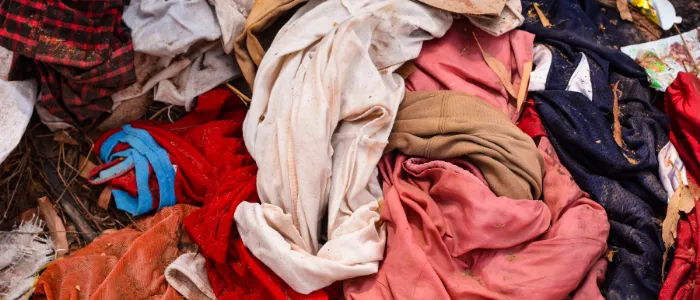Upparel Stepped Up

Good for the planet = good for business: How Upparel stepped up to save a million garments from landfill
In a few short years, a Melbourne company has made the journey from conventional retailer to circular fashion hero, proving along the way that sustainability truly equals success.
October was an incredible month for Tina and Michael Elias, co-founders Manrags, which started as a subscription service for men’s socks and undies. First they rebranded as Upparel to better capture their wins in sustainability and the circular economy. Then they won the National Retail Association’s Sustainability Champion of the Year award.
In one short year – half of it during Covid-19 – they stopped 100,000 kg of textiles from being dumped in landfill, preventing the release of over 400,000 kg of greenhouse gases into the atmosphere. As well as doing good for the planet, they discovered that offering a recycling service led extraordinary growth for the business. In July they raised capital to grow Upparel further.
It starts with socks
Manrags stared in 2016, and began its anti-waste program in 2019. “We realised, hang on, how much how much product have we sent out? What effects have we had on landfill? And that’s when we really started to look at how much we’d added to textile landfill,” explained Tina. “Socks and underwear can’t be donated to charity. So where are they going? Essentially they going to the tip. We can stop that by accepting old socks from customers and diverting them from landfill.”
In just four months they redirected 15,000 kg of socks from the tip. “There was such a high demand for people to send us their other textiles, and then Covid gave us the opportunity to pivot a little,” says Tina Elias. They began to accept all textiles. “Everyone was home and they were clearing up their cupboards, and charities were closed”, she explains. Manrags began accepting all types of textiles, as well as shoes. Customers pay $25 to have a box of unwanted clothes collected, redeemable on orders of stylish socks and underwear. It is then sorted and either repurposed or recycled.
Reuse
Upparel is an example of the circular economy in action. Charity partners such as Sacred Heart Mission and Ready Set distribute clothing to people who need it, accounting for over half of the textiles Upparel receives.
“Seventy percent of textiles that come into our warehouse from consumers is fit for wear. A lot of clothes still have the tags on them,” says Tina. “When we say fit for wear, if it’s not good enough for us, it’s not good enough to give to a charity. We’ve teamed up with charity partners all over Australia and we distribute these fit for wear pieces all over the country. We don’t send anything offshore, because sending products offshore only causes problems in third world countries,” she explains.
The clothing has already been sorted and selected for wearability, unlike many direct clothing donations. Charities in Australia last year spent $13 million disposing of unsaleable textiles to landfill. “So we are coming forward and saying hey don’t – this is from people who are truly dumping their rubbish out in front of charity shops. They’ve created this burden for charities – horrible because charities are not-for-profit,” says Tina. It’s also more cost-effective, as recycling is cheaper than sending items to landfill.
Repurpose
Then 20% of textiles are repurposed, such by making old jeans into new denim products with partner store Homie. “The repurposing part is in its infancy, but more and more brands are coming on board and taking advantage of these textiles that we have which are fit for repurposing,” says Tina.
Recycle
The rest of the textiles are recycled. Cotton and similar fabrics are shredded, some to be used to fill mattresses, pet beds and home insulation. Polyester-based textiles are shredded and processed into chips which are reused to make more polyester.
Recycling is done by partner companies. “We just don’t have the infrastructure setup as of yet, but we’re definitely working on that,” says Tina. “The company still in its infancy. Definitely within the next five years, we’d love to have machinery in order to be recycling our own products in Australia. That would be really incredible.”
So what’s next for Upparel?
“As of next month, we’re receiving our first socks made with 50% recycled cotton,” says Tina. “Underwear going forward is all premium organic cotton which is GOTS [Global Organic Textile Standard] certified. We’re really taking accountability for all of our products and ensuring that the whole process from start to finish is as sustainable as possible. We’ll be releasing more products mid next year, including T-shirts with 100% recycled cotton.”
“We definitely don’t have all the answers,” says Tina, “but we’re learning new things every single day and we’ve only just scratched the surface. I can’t wait to see how far we come this time next year – how many textiles we will have diverted and repurposed and recycled here.”
Can you Step Up by recycling and repurposing clothing, and by buying items made with recycled content where you can? Share your Step Up action by taking a selfie, sharing it and tagging @CleanUpAustralia #StepUptoCleanUp.
